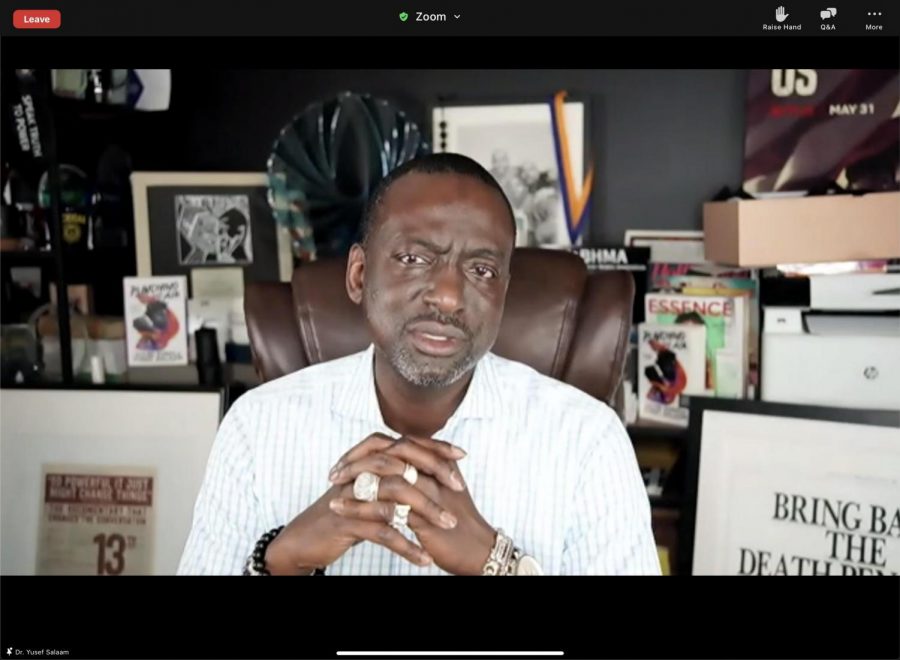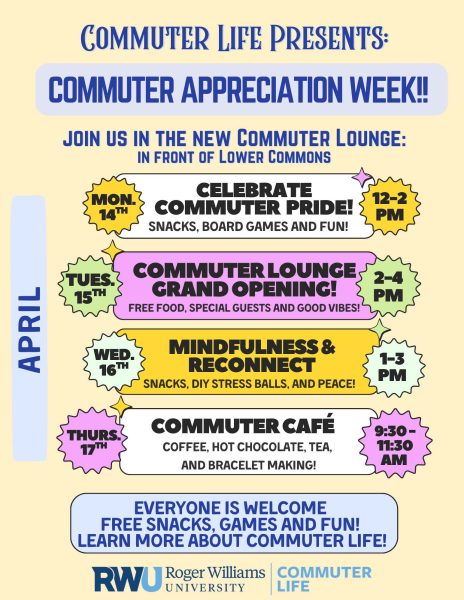“We have to be the roses that grow out of the concrete:” MSU hosts Dr. Yusef Salaam for its Honoring Black Resilience event
MSU hosted Dr. Yusef Salaam who gave a moving keynote address followed by a Q&A session on Feb. 23.
Dr. Yusef Salaam was 15 years old when he and four other teenage boys were arrested and later convicted for the rape and assault of a 28-year-old woman in New York’s Central Park. To many, Dr. Salaam is recognized as one member of the Central Park Five. He would go on to serve six years and eight months of a five to 10 year sentence for a crime he did not commit.
In the years following Dr. Salaam’s incarceration, he became a motivational speaker, author and coach in order to help people break through boundaries. The Multicultural Student Union (MSU) invited Dr. Salaam to speak to the RWU campus to discuss the inequalities within America’s justice system on Feb. 23.
Nathalia Monte, secretary of MSU, played a key role in setting up the online event as committee co-chair. She believes it is important for the RWU community to hear what Dr. Salaam has experienced and the many injustices that marginalized people have faced, because many members have not shared the same experiences.
“This type of discussion is important in every climate, whether it is political or not. We need to get away from the idea that when we discuss Black issues it is only important on the sole basis of politics. These are human rights issues, not a debate on people’s lives,” Monte said.
“I hope attendees take away that these are situations that are still happening in these communities. Racism and injustice to BIPOC are something that is not of the past, but present and relevant in today’s society,” Monte said. “I also hope that students learn that racism can be uncovered in many different cases. In Dr. Yusef Salaam’s case, it was shown through the Department of Justice system. These types of racist acts and behavior are still shown today in all institutions, including education, healthcare, politics and housing.”
The event began with an introduction of Dr. Salaam’s story, which started in 1989 when he and the four other boys were arrested. After the introduction, Dr. Salaam brought forth his memories from that year.
“April 19 of 1989 was when I was awakened from the American Dream to the American Nightmare,” Salaam said.
Dr. Salaam described his feelings as he walked into the prison complex and began remarking on the echoes of the word “guilty” that filled his ears before he was even sentenced.
When asked for his last statements at his sentencing, Salaam said, “sitting here at your table does not make me dinner, just like being here in America doesn’t make me an American.”
He reminisced on the moment his life trajectory changed after being asked “who are you?” He realized he had to look at life in a positive light instead of a negative one, even as he sat in prison as a teenager for a crime he did not commit. He went on to talk about how Black children are plagued by the future, of either being dead or in prison by the age of 21, and described it as a gravitational pull toward a life of prison.
Once in prison, Dr. Salaam took the chance to define who he is to himself, starting with meditation. He fought against the preconceived notion that he belonged in prison because of the color of his skin and the seemingly destined path of life.
“I didn’t want to die in there. I had to refuse to accept the meaning that they had given my life,” he said.
He brought up the irony in how it took 13 years for the truth to come out, an unlucky number for many and a lifetime for the Central Park Five. He highlighted the large number of people involved with the Innocence Project, a nonprofit organization that works to exonerate wrongly convicted individuals, and mentioned how DNA is such a small piece of evidence that has exonerated so many.
After Dr. Salaam’s 30-minute keynote address, MSU held a moderated Q&A session beginning with questions from BIPOC students on campus. MSU treasurer Jarielys Polonio opened the session with a question regarding changes that need to be taken to fight inequalities in the justice system.
“The system is not actually alive and well. The system is alive and sick. The system is not broken but it is actually operating exactly as it was imagined,” Salaam said.
The next question asked if he believes in abolishing the police, to which he called for the creation of a new system and referenced a Jewish organization that has successfully policed themselves in the city of New York.
A webinar attendee asked Dr. Salaam how he is at peace after everything he has gone through. He described how it was necessary to remain positive in order to find peace and be able to move on. He expressed how important it is for him to speak on his experiences and help other people understand the issues found within the criminal justice system and how speaking of this is one way of healing. He spoke about how people call out for equality and not revenge and detailed how people don’t realize there is a difference.
Dr. Salaam ended the Q&A with advice on self-preservation.
“My advice to preserve your own self in hard times is to constantly wake up when your brain is operating at 10 wave cycles. The first few moments of your awakening,” Dr. Salaam said. “Constantly surround yourself with visual vision boards or mental vision boards, see those notes reminding you you are excellent.”
Emily Dvareckas graduated from RWU in 2022 with a degree in forensic science. She spent three years with The Hawks’ Herald as the photo editor...





